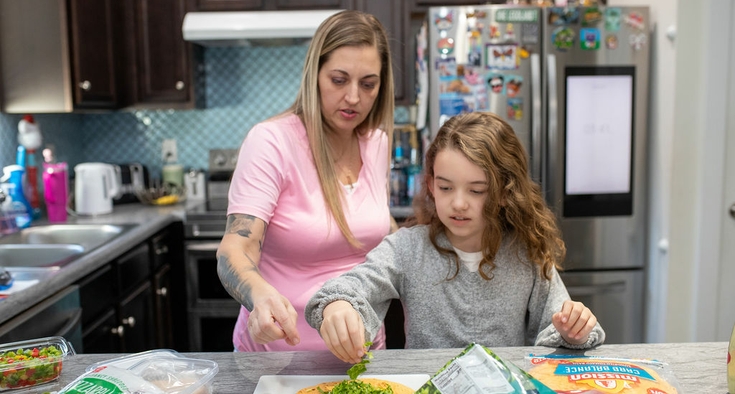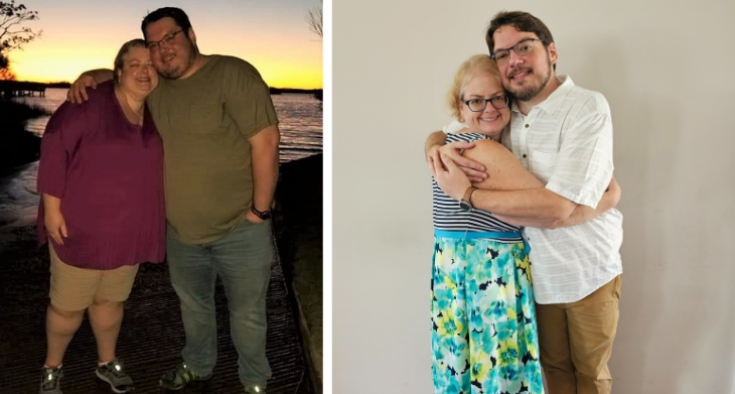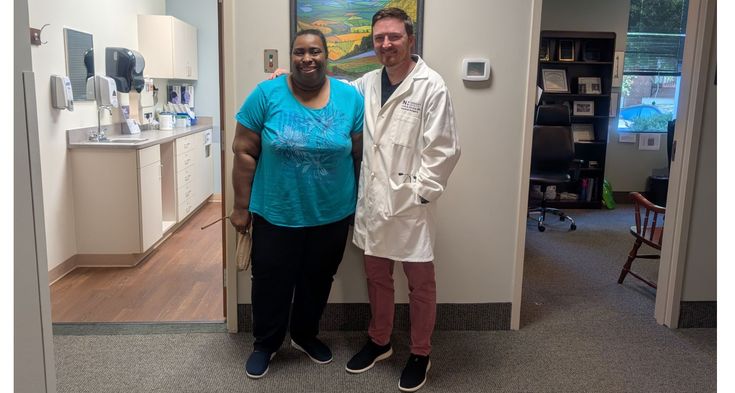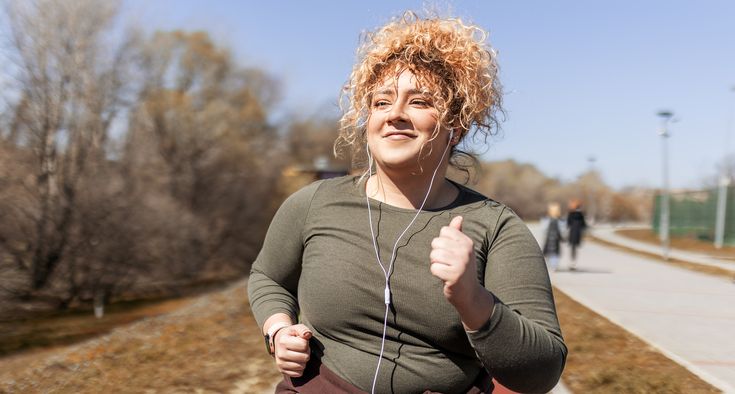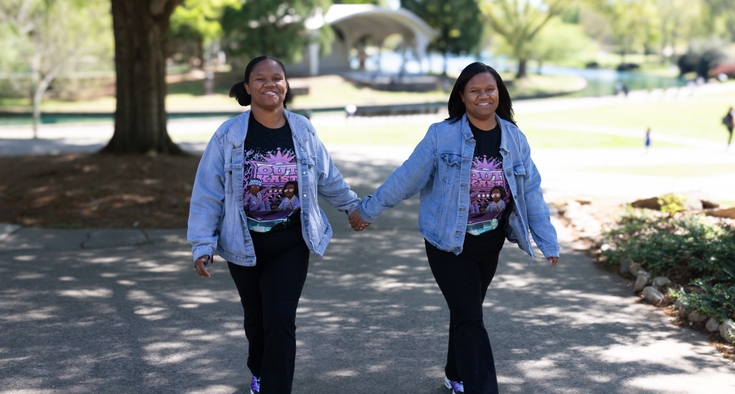Tara McAlinn had watched her weight creep up over the years.
She’d start a diet, “mess up” and tell herself she’d start again tomorrow. “But tomorrow never came,” McAlinn, 42, said. “It was the same thing over and over every day.”
She tried weight loss medications and exercising (which didn’t help her lose much) and Ozempic (which made her throw up). One day McAlinn surpassed her highest pregnancy weight — seven years after her daughter was born. “I kind of gave up,” McAlinn said. “I felt like it was never going to get any better, that this was just how I was and how life was.”
As a single mom of two living far from family and working two jobs, McAlinn had been focused on everyone but herself.
But in late 2022, fed up with aching body parts, getting winded, and feeling numb and depressed, McAlinn made a choice: “To make myself a priority.”
Here’s what she did — and how she lost 93 pounds along the way.
Lose weight safely and live a more active, healthy life.
4 things she did to prioritize her health and lose 93 pounds
‘I started doing small things for myself.’
McAlinn was busy running her daughters to school, lacrosse, dance and Girl Scouts — but never planned anything that she would enjoy. She realized: “Really, I can schedule one thing for myself!”
She had wanted to join the women’s ministry at her church – so she did. A few months later, she went out for a girls’ night – which became a monthly event. Soon, she had built a support system.
Before, it had been just her and her daughters; now, “I had made a family for myself,” McAlinn said.
‘I asked two coworkers to start walking with me at lunch.’
Feeling momentum, McAlinn asked two coworkers to start walking with her during their lunch break.
Their initial goal was a mile; eventually, they built up to 3 miles every day.
They took regular selfies to document their walking club. “Over the year, you can see the changes in my face as I started to lose weight,” McAlinn said. “If you can get somebody to walk and talk with, you don't even feel like you're working out.”
The companionship, the mental clarity she felt after walks, and her well-deserved hot shower later at home felt like additional self-care.
‘I asked for help.’
Although McAlinn was gradually losing weight, the amount she needed to lose felt overwhelming. She had looked into bariatric surgery before, but at the time, wasn’t ready to undergo the physical and mental commitment surgery required – especially since she didn’t have help with her kids.
In 2024, she had a new “village” from church and work, depression was lessening, and McAllin’s self-image was improving. “Something in me was ready,” she said. “I realized that there were so many people who cared about me and would support me.”
Best doctors. Amazing nurses. Remarkable care.
Before her consult with surgeon Dr. Thomas Gavigan of Novant Health Carolina Surgical - Randolph in Charlotte, McAlinn still worried that having surgery was selfish. “As a mom, there’s that inevitable guilt of doing anything for yourself,” she said.
McAlinn still remembers Gavigan’s words: "‘You're doing this for you, but you're also doing this for your kids’” by taking ownership of her health. He answered all her questions and promised to be there every step of the way. Their consult “solidified everything that I already knew I wanted for my life,” McAlinn said, so she set a date for surgery and asked friends for help with childcare, driving and meals after surgery.
‘I worked really hard.’
Bariatric surgery isn’t a quick fix, McAlinn said: “The doctors do their part, but if you don’t do yours, it won’t work.”
McAlinn took care of the prerequisites before bariatric surgery, including psychological and medical evaluations. Two weeks before her surgery, she began a liquid-only diet that she maintained for a month until her body was ready for solid food again.
Now, she’s “very regulated” with what she eats, focusing on four to five small high-protein, low-carb meals a day. She walks at least 3 miles a day, goes to the gym four times a week for strength training and cardio, and cut out all carbonated drinks.
When she goes out to eat, she uses portion control. For example, at Starbucks, she’ll get a low-sugar drink and have one, not three, in a day. “I’m still enjoying all the things I like,” she said.
Since her surgery March 15, 2024, she’s down 93 pounds — from 233 pounds to 140 pounds. Her body mass index (BMI) dropped from 42 to 25. Instead of feeling deprived, she feels great: “I have less joint pain, all my numbers are better, and I'm not going to have sleep apnea anymore. I was borderline diabetic and it’s no longer an issue. My life is totally different,” she said. “It’s not just physical. It's mental, it's emotional … I got me back.”
Bariatric surgery: A tool that helps some be the ‘best versions of themselves’
If your body mass index (BMI) is over 30, diet and exercise changes aren’t helping you reduce your weight, and you’re starting to experience serious weight-related health problems — you may be a candidate for bariatric surgery. For an evaluation, schedule a consult with a Novant Health weight-loss specialist. Learn more here.

Bariatric surgery helps you lose weight and reduces your risk of weight-related health problems that could limit your life. If you meet the criteria and are ready to work hard, it could be a possible tool for you, surgeon Dr. Thomas Gavigan of Novant Health Carolina Surgical - Randolph in Charlotte said. (Gavigan specializes in bariatric surgery, general surgery and critical care medicine.)
This surgery is not done for cosmetic reasons, and it’s not a quick fix. Candidates must complete several prerequisites and be cleared by a team before surgery. They must also commit to follow a specific diet and exercise plan and keep working with their medical team after surgery.
“Surgery is a big deal. Anybody that tells you that surgery isn’t a big deal hasn't experienced it or doesn’t practice it on a daily basis,” Gavigan said. “It’s an extensive process, but also has a really impressive benefit: the weight loss is an avenue to improving diabetes, decreasing blood pressure problems, getting rid of high cholesterol, decreasing knee and joint pain, and getting rid of obstructive sleep apnea problems.”
Only about 5% of patients who meet the criteria for bariatric surgery will lose the weight they need to with diet and exercise alone, Gavigan estimates. Surgery can help them improve weight-related health issues before they get worse, and studies show bariatric surgery improves life expectancy for obese patients by five to nine years.
Before entering medical school, Gavigan worked as a wilderness survival guide, where he helped backpackers get to their desired destination. In bariatric surgery, he sees the same process: a skilled team working together with the patient, to help them get to a healthy life.





